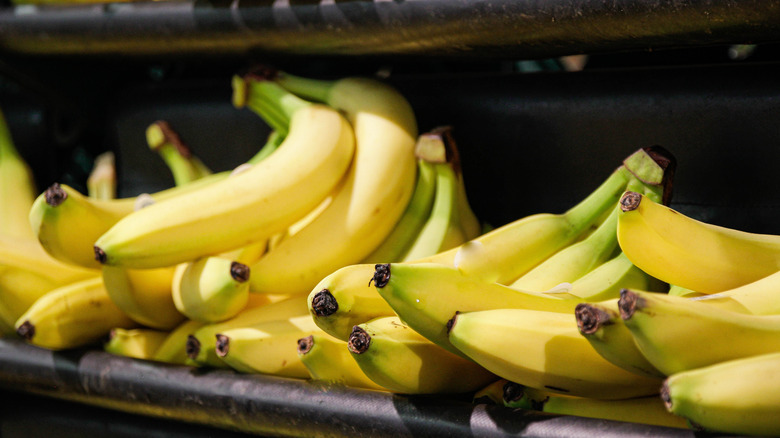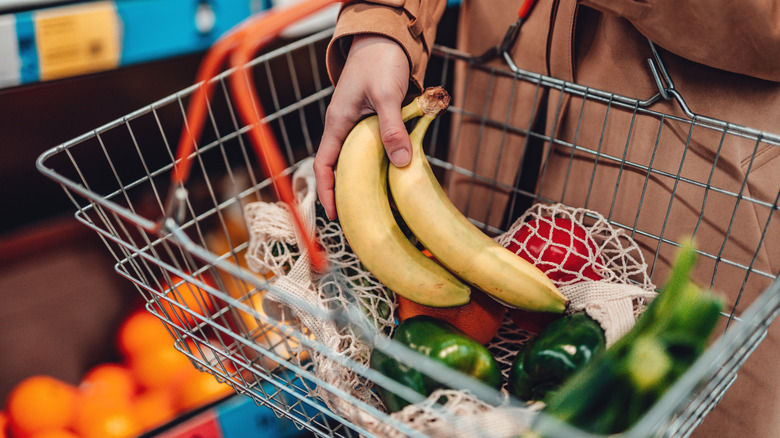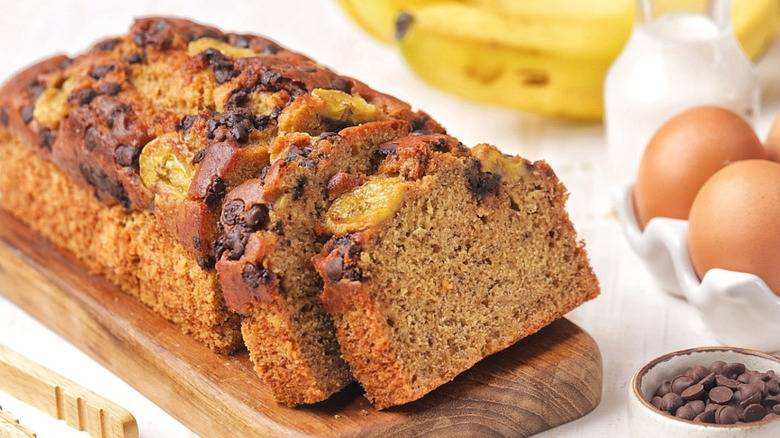Why Aldi Shoppers Avoid The Store's Bananas
Whether you're eating them fresh for a mid-morning snack, or using them to make bread, pudding, or even ice cream, bananas are one of the world's favorite fruits for a reason. And when you're looking for a great-value grocery haul, cult favorite low-cost grocery store Aldi is hard to beat. It would follow, then, that when you're looking to pick up a bunch of bananas, a trip to Aldi is in order. But unless you like bruised, moldy, or mushy bananas, you might want to think twice.
When you consider how to really shop at Aldi, it can be a great place to stock up on everything from pantry staples like oils and spices, to German-style snack foods. But the banana selection causes controversy even among the most devoted Aldi enthusiasts. On the subreddit dedicated to the store, r/Aldi, users complain about buying underripe bananas, only to find they're still green weeks later. Others report seeing "broken, damaged, and rotted" bananas on display at the store, leading them to avoid a purchase entirely. One user summed up their feelings about Aldi bananas in three simple words: "Never. Never. Never."
While not all Aldi shoppers report problems with the bananas — and there are plenty of people who simply don't like or buy bananas, whatever store they shop at — the trend is clear, and it doesn't look good for Aldi. But why are the bananas so often a disappointment? While all produce is subject to natural variations, bananas are a delicate fruit which must be harvested before fully ripe, and are easily damaged or altered during the shipping process. They can also risk damage later on in the process, depending on the temperature at which they're stored. This means that stores selling large quantities of bananas with a complex and varied supply chain, including Aldi, can be subject to extreme quality variations.
Why buying bananas can be a tricky business
Whether you're shopping at Aldi or your local produce stand, bananas can be one of the trickiest fruits to purchase. Partly, this is a question of quantity. You can buy bananas by the bunch, but it's also fine to snap off a smaller amount if you don't intend to eat them all. While you might feel a little unusual buying a single banana at a time, there's no rule against it, and it can help you avoid food waste!
The other issue is timing. Unlike berries or grapes, bananas have to be peeled and can't really be eaten a little bit at a time. Plus, unlike melon, cutting them up and putting them in a container in the fridge will just lead to a soggy mess. That means you'll need to figure out when you're going to eat however many bananas, and purchase accordingly. This is where you might want to consider buying bananas that aren't quite as ripe as you'd prefer, and following a guide on how best to ripen your fruit, so your bananas are full of flavor the moment you finally eat them.
Getting the most out of your bananas
Even if your bananas aren't at the ripeness you prefer, there's no need to get upset. One of the best things about bananas, whether you buy them at Aldi or not, is how versatile they can be. They can be cooked into sweet or savory recipes (Swedish banana-chicken casserole, anyone?), enjoyed hot in a flaming dessert or cold from the freezer, or eaten raw. It's a clear sign to get over your banana hangups on how ripe a banana should be when you eat it, or cook with it.
While many people enjoy a certain level of ripeness in a fresh banana, there are uses for the ripest bananas, the greenest bananas, and every banana in between — so there's no need to waste bananas you already have. Even if your Aldi bananas turn out to be a disappointment, you can still make them into something scrumptious.
You can also make your bananas' ripening conditions work for you. While there's no way to "un-ripen" a banana, you can slow the ripening process by storing them in the fridge, or by wrapping the stems in aluminum foil, which keeps them fresher for longer. On the other hand, you can ripen your bananas in a hurry by storing them somewhere dark, such as inside a brown paper bag. This technique can be especially useful if you need overripe bananas for baking banana bread or another banana-based treat.


